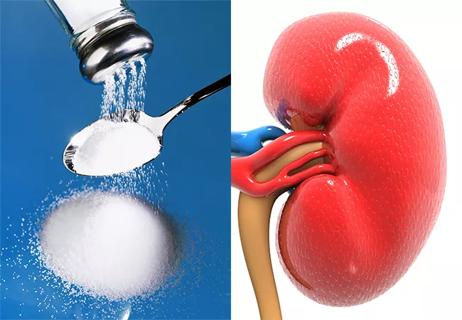Screening and medication key to better outcomes

Greater use of screening and medication for diabetes-related chronic kidney disease (CKD) is crucial in order to mitigate risks for patients and reduce unnecessary burdens on health care resources.
Advertisement
Cleveland Clinic is a non-profit academic medical center. Advertising on our site helps support our mission. We do not endorse non-Cleveland Clinic products or services. Policy
A recent report on the unmet needs of patients with diabetes and CKD, published by Cleveland Clinic physicians in the Journal of Diabetes and its Complications1, identifies opportunities for significantly improving care for patients at high risk for developing cardiovascular and end-stage kidney disease (ESKD). The authors reviewed data from Cleveland Clinic’s enterprise-wide electronic health record from 2005 to 2019. The patient pool was divided into three cohorts: those with CKD, those with type 2 diabetes (T2D), and those with both CKD and T2D. The goal was to better understand screening uptake and the use of appropriate medical interventions.
“We now have multiple medications to help reduce the risk of progression of CKD in patients with and without type 2 diabetes,” says endocrinologist Kevin M. Pantalone, DO, Director of Diabetes Initiative in the Department of Endocrinology, Diabetes & Metabolism. “But, in order to identify those patients and treat them, you have to make sure you’re doing the appropriate screening.”
Key findings:
Advertisement
“When we looked at patients receiving therapies that are known to help protect kidney function – ARBs and ACEi – we see that while many patients received them, there were a lot of patients who probably should have received them and didn’t,” says Dr. Pantalone. “These medicines have been around now for many years, and they are inexpensive. Thus, the cost of medication cannot be argued to be the barrier.”
One barrier, however, is underutilization of testing to identify patients who might benefit. In 2019, the percentages of patients who had a urine protein assessment were 7.6 for those with CKD; 30.2 for those with CKD and T2D; and 20.1 for those with T2D.
While the researchers did not ascertain reasons for low uptake of urine protein screening, Dr. Pantalone says it is likely a combination of physicians not ordering the tests and patients not following through when tests have been ordered.
“There’s no reason to not be screening your patients with type 2 diabetes with or without CKD. Annual screening of urine protein is considered a standard of care intervention,” he says.
When it comes to protecting the kidneys from diabetes-related damage, the stakes are high.
“Dialysis carries a very high burden of morbidity and mortality for patients,” says Dr. Pantalone. “And from a system perspective, patients on dialysis require more resources and interventions. So if we can identify a group of patients earlier in the course of disease, and implement interventions to reduce the risk of progression, we can eventually reduce the number of patients who end up with ESKD.”
Advertisement
Avoiding ESKD isn’t the only goal. Chronic kidney disease in patients who have lower estimated glomerular filtration rates (eGFR) are at significantly high cardiovascular risk. Patients with CKD are five times more likely to die from cardiovascular disease than develop ESKD.2
“Having CKD carries a risk of adverse cardiovascular events that is equivalent to somebody who has already had a diagnosis of cardiovascular disease, because their risk of dying from a cardiovascular event is so high,” he says. “So identifying these patients through screening and making the appropriate therapeutic interventions is important from the standpoint of reducing the risk of CKD progression as well as reducing the risk of cardiovascular events.”
The researchers also are pursuing a longitudinal analysis to identify how patients evolve over time with CKD and to assess ways that acute events such as hospitalizations may accelerate the worsening of the disease.
“We know when patients are hospitalized, they don’t usually get back to their previously disease baseline. They have a new baseline,” says Dr. Pantalone. “So it will be important to follow patients, observe how they change, and develop algorithms to predict who is at the highest risk of progression.”
More information also is needed to establish why patients who should be having urine protein assessments aren’t undergoing testing.
“We want to look at the patient-provider relationships where we have inertia and see who’s driving it,” says Dr. Pantalone. “We have a diabetes health maintenance component in our electronic health record. It’s obvious to anybody that it’s flagged — that it needs to be done every year along with a dilated eye exam. And in many cases, it is ordered, but it’s just not completed.”
Advertisement
For providers who want to make the most of opportunities for CKD patients, Dr. Pantalone notes the importance of securing the right data.
“We do a good job of checking GFR because we order routine blood tests that contain the serum creatinine, and we use formulas to calculate the patient’s estimated GFR,” he says. “But you need the eGFR and the level of protein in the urine to adequately stratify a patient’s risk of CKD progression. A patient may have CKD stage three and be at a much higher risk of progressing if they have a reduced GFR in addition to significant protein loss in the urine.”
In addition, he says, the work of improving screening and medication uptake falls largely to primary care providers. “They manage over 90% of patients with type 2 diabetes,” says Dr. Pantalone. “We need to work with our primary care providers to develop strategies to improve the likelihood that the annual UACR test is obtained, and that if the result is abnormal, that it’s acted up accordingly.”
1. Pantalone KM, Ji X, Kong SX et al. Unmet needs and opportunities for optimal management of patients with type 2 diabetes and chronic kidney disease. J Diabetes Complications 37(4):108418 (2023).
2. Dalrymple, L.S., Katz, R., Kestenbaum, B. et al. Chronic Kidney Disease and the Risk of End-Stage Renal Disease versus Death. J Gen Intern Med 26, 379–385 (2011).
Advertisement
Advertisement

Large-scale joint study links elevated TMAO blood levels and chronic kidney disease risk over time

Investigators analyze dysnatremias using the Chronic Renal Insufficiency Cohort (CRIC) Study

Cleveland Clinic nephrologist and site PI distills its significance and offers considerations

New retrospective analysis of clinical trial data provide some reassurance regarding the safety of aspirin in patients with CKD

One pediatric urologist’s quest to improve the status quo

The advanced stage of diabetic retinopathy is among the most challenging for retinal surgeons

Meta-analyses signal an opportunity to reshape risk stratification and surgical protocols for these comorbidities

Association revises criteria for the diagnosis and resolution of severe conditions